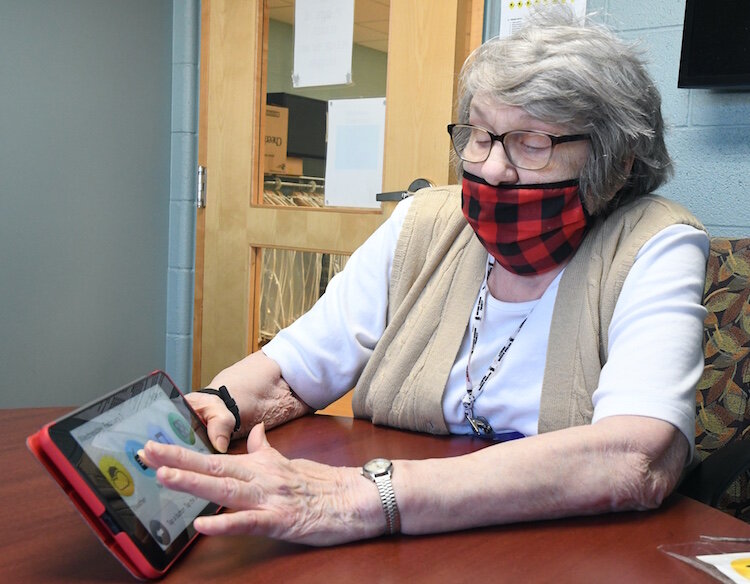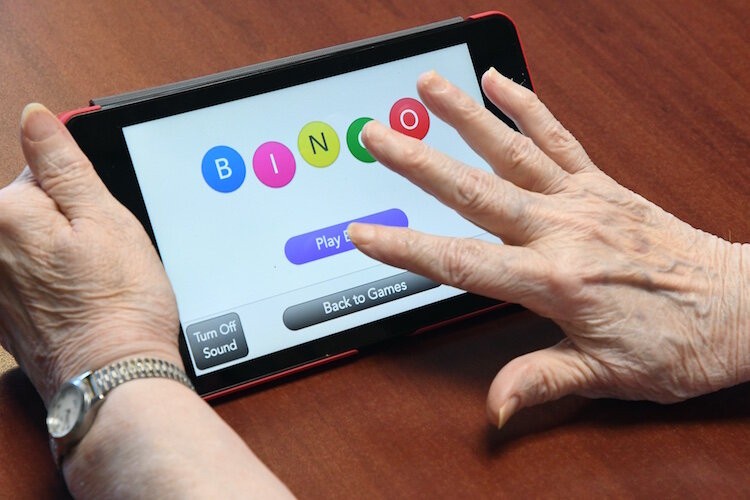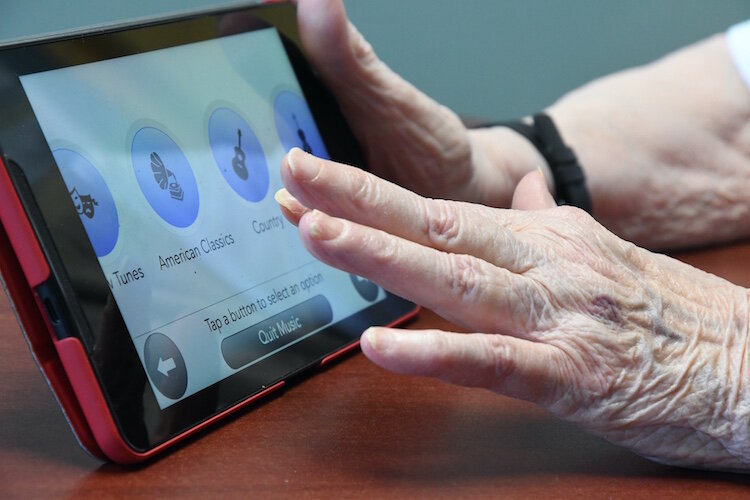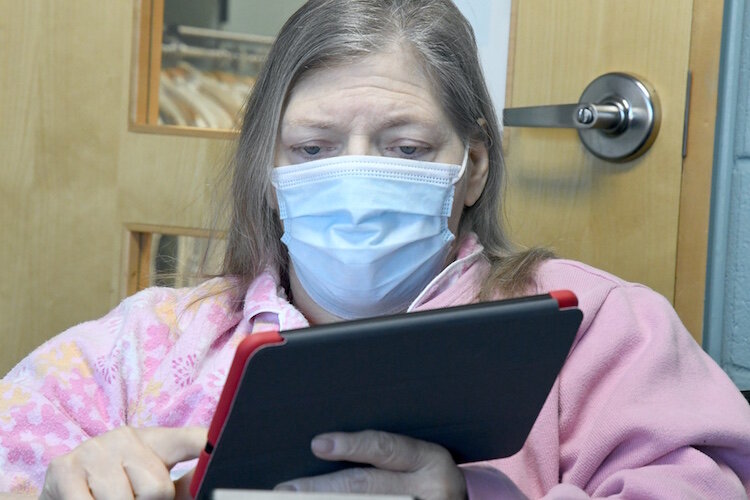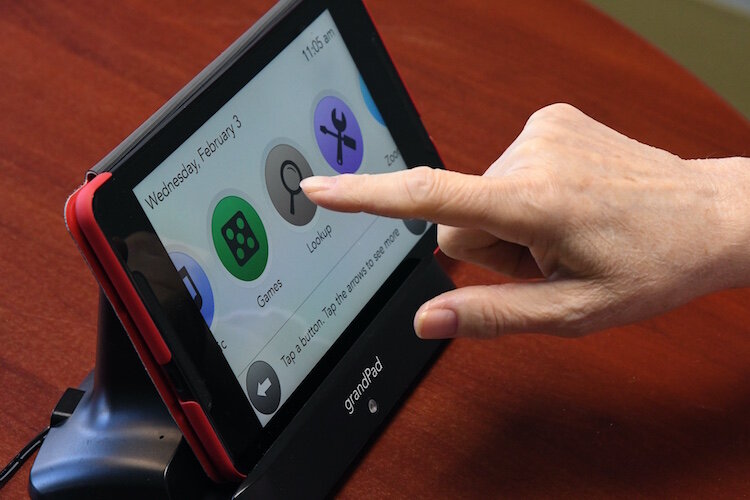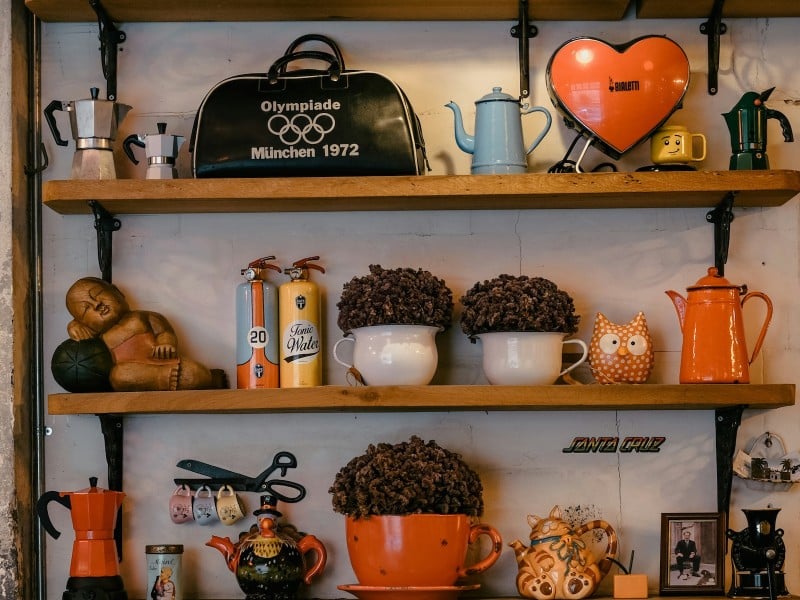The GrandPad: New device helps seniors in Calhoun County stay connected as pandemic lingers
Isolation can be a real threat to seniors. In Calhoun County that need for connection is in part being met through the use of GrandPads, a device just for older folks.
Editor’s note: This story is part of Southwest Michigan Second Wave’s On the Ground Calhoun County series.
A device about the size of a standard tablet is connecting older adults in Calhoun County to family and friends and keeping them active and engaged during a pandemic that has limited their options for interaction of any kind.
Jerilyn Finn-Cummings, who will be 79 in March, looked down at her GrandPad, which is what the tablets designed for seniors are called, and says she doesn’t know what she’d do without it. A retired nurse and participant with Senior Care Partners P.A.C.E. located in the Kool Center, she says she feels fortunate to have options that were not available to her a few months ago.
“I can get a music lesson or entertainment. I can play games like Bingo and Hangman. I can get exercise classes on it and I can see the woman doing them in my home,” Finn-Cummings says. “When I’m waiting for the bus to come, I play Bingo. There are all kinds of card games and crossword puzzles. There’s also Zoom video calls.”
While these choices are important, she says she also values the ability to attend meetings twice a week hosted by the Jehovah’s Witness and Coffee Klatches with her friends from the senior center. A calendar on the GrandPad helps her to stay organized and up-to-date on her meetings and gatherings.
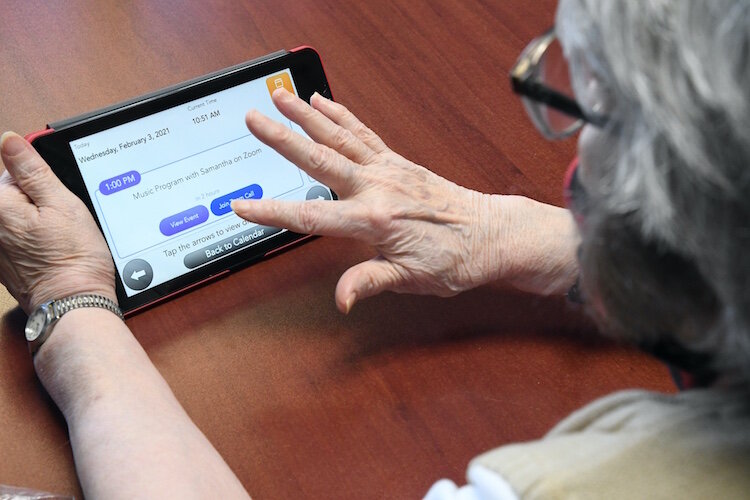
“I can’t imagine with the pandemic what my life would be like without it,” Finn-Cummings says.
There are currently about 225 GrandPads being used by participants in the Senior Care Partners P.A.C.E. program in Calhoun and Kalamazoo counties. In addition to the Battle Creek location, the program also has locations in Albion, Kalamazoo, and Portage.
The GrandPads cost $800 each. Grants cover the cost of the devices and Wi-Fi access. Additional grant funding was just received that will increase the total number of GrandPads available for older adults in Calhoun County to 151.
There are about 600 participants in the Senior Care Partners programs, all of whom are age 55 or older, and the hope is to eventually have enough so that they each can have one, says Laura Ferrara, CEO of Senior Care Partners P.A.C.E.
“Each participant is scheduled every six months for a clinical assessment so our teams can see how they’re doing,” Ferrara says. “Teams are using the GrandPads to do virtual assessments when appropriate to look at the individual from a social and psycho-social perspective and to provide medical intervention. During that assessment window, participants get a GrandPad for two weeks. We have some participants because of psycho-social or other needs who might exceed that two-week timeframe and for them the GrandPad becomes an intervention as part of their care plan. If that is a necessary device to meet their needs, they can get it for a longer period of time.”
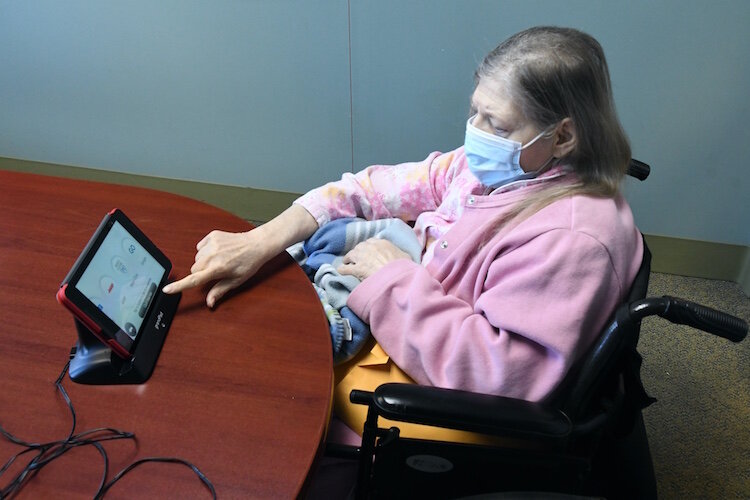
Prior to the pandemic, Senior Care Partner participants were able to come to one of the four daycare locations to participate in programs and activities, have a meal, or receive care. Ferrara says it is a very social, hands-on model of care that was paused out of an abundance of caution for members and staff.
“Participants enjoy their time in the care center. With the pandemic, we had to re-create how we are providing participant care in homes rather than using the day centers. This led to loneliness and depression,” Ferrara says. “We want to keep them engaged in a way that’s meaningful and purposeful.”
After trying out several devices, the GrandPad was selected because of its ease of use with older adults.
“We tested it internally and found that the GrandPad is easier for participants to use and provided higher levels of interaction,” Ferrara says. “It’s like an iPad. The difference is the icons. It takes one button that is readily visible and is easy for an older adult with cognitive or functional deficits to use. There are many different connections that older adults can make with the GrandPad. They have the ability to communicate with someone as well as virtual activities and tours. Any type of recreational app is on there or can be downloaded easily.
“We’ve had great success with the GrandPads with members who have dementia. We’ve got a woman with moderate levels of dementia and she was able to connect with her sons and you could really just see in her face and hear in her voice how animated she was by this.”
The feedback Ferrara has received from participants is that the devices are very easy to use and helps them with their finger dexterity.
Finn-Cummings says she feels “very confident using it.”
Laurel Thwaites, 64, who worked as a Peer Support Counselor at the SHARE Center and as a Supply Technician at the Federal Center, says she finds her GrandPad easy to use and appreciates that if she gets stumped someone is always available to answer questions or address concerns she may have.
Should participants like her require technical assistance they can press a red “help” button on their device which will connect them to a GrandPad support person 24/7. They also are able to connect with Senior Care Partners P.A.C.E. 24/7 through their GrandPad. And it also has options to connect directly with someone if they just want to talk to someone or hear a friendly voice.
A window to the world without leaving home
Finn-Cummings says if anyone had told her 20 years ago that she’d be able to see someone and talk on a device like this from her home, she likely wouldn’t have believed them. She says the GrandPad alerts her to incoming calls by ringing and lighting up.
What may seem commonplace to those who are technological savvy is fairly new to her and she is embracing the ability to get everything from real-time detailed weather updates, to the Big Band music that she likes, to calendar updates, to the activities she most enjoys doing.
“Our recreational staff has used the GrandPads to continue to do activities for our participants like a virtual book club or Bingo,” Ferrara says. “These are among the recurring activities they can participate in.”
Although the four day-centers never closed, they have not been close to full capacity since the pandemic became a cause for concern and caution in March 2020. Ferrara says space at each of the day centers is limited to those who need therapy or have social or psycho-social needs that must be addressed. Appropriate social distancing, barriers, and constant disinfecting are standard operating procedures at all of the day centers that care for participants.
Since the day centers went to a limited-capacity model, Ferrara says her staff has gotten very creative with ways to keep participants engaged. In addition to making regular calls to see how people are doing, they have created individualized activity packets to meet each participant’s preferences and needs. So, if an individual likes to color but is visually impaired special supplies are included. These packets are delivered to their homes by staff and that provides an additional opportunity to see how participants are doing from a social and health perspective.
“For an older adult, the impact of this pandemic has been even greater than it has been for those who are younger. Social isolation and loneliness are huge health factors for older adults and can cause cardiac and other health events,” Ferrara says. “The highest rates of infections and deaths from this pandemic have been in older adults. More of them are staying at home and sheltering at home. You see that play out in their emotional and physical well-being. There is an Impact on older adults across the whole spectrum of their physical and psycho-social well-being.
“For those who can’t come into the day centers, the GrandPads give them the ability to remain active and keep in touch. They use them to stay connected with each other and family members and friends.”
Thwaites says this is how she keeps in touch with her son and 6-year-old grandson who live in Florida. She says she has been able to have some interesting conversations with her grandson, which bring a smile to her face.
When not talking with them or friends, she participates daily in “Bible Answers” hosted by the Seventh Day Adventist Tabernacle, her church, and listens to the Gaither Vocal Band and the Booth Brothers, among her favorite musical groups.
“If I’m not listening to music, I’m listening to Bible studies. I just press on the one I want. I’ve learned different scriptures and songs. Sometimes, I listen to old hymns,” Thwaites says. “Sometimes the words are on the screen.”
She also participates in the Coffee Klatsch’s and in trivia games and uses her device to shop and check the date and the weather. She says she would likely play games like Solitaire but says she doesn’t want to run the battery down.
The GrandPad, Thwaites says, has become a vital part of her everyday life. “It keeps my mind alive and it keeps me connected.”

